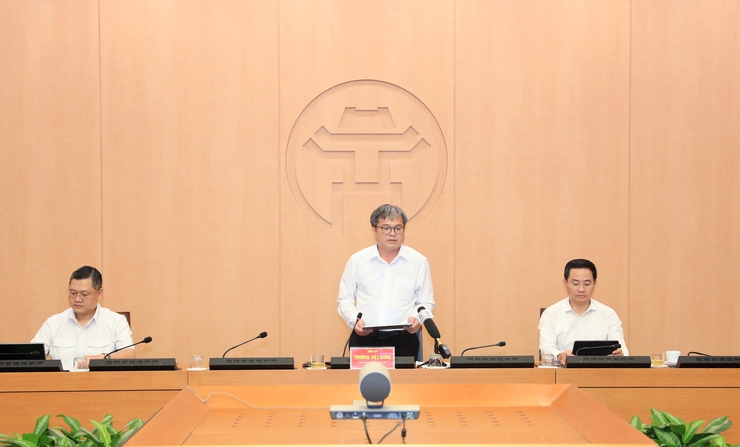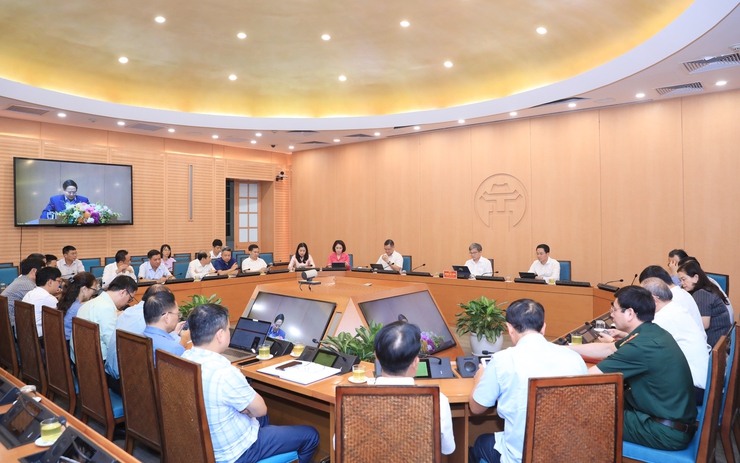Vice Chairman of the Hanoi People's Committee Truong Viet Dung delivered a speech at the fourth meeting of the Government Steering Committee on the Development of Science, Technology, Innovation, Digital Transformation and Project 06,
Dung said the city has seriously implemented Resolution 57 of the Politburo and Resolution 71 of the Government. Out of 22 assigned task groups, 11 have been completed, and the remaining 11 are being carried out with determination, ensuring progress without delays.

Overview of the meeting.
In addition, the city has worked to institutionalize Resolution 57-NQ/TW and the 2024 Capital Law. At its special session on September 29, 2025, the City People's Council is expected to adopt six important resolutions on science, technology, and innovation.
These include the establishment of the Hanoi Technology Trading Floor, a pilot venture capital fund and its operating mechanism, the Hanoi Innovation Center, policies on science and technology development, a controlled regulatory sandbox, and mechanisms to support the innovation and startup ecosystem.
Together, these resolutions will form a comprehensive legal foundation for an innovation ecosystem covering research, testing, commercialization, and market expansion. Hanoi is committed to implementing them citywide once adopted.
The city is gradually building growth hubs in science and technology. At Hoa Lac Hi-Tech Park, covering 1,582 hectares, 91.9 percent of the land has been cleared.
Work is beginning on a smart city adjacent to the park, and construction of the Van Cao–Hoa Lac urban railway will start in December 2025.
Public investment is being allocated to clear 460 additional hectares for park expansion. The city is also developing three digital innovation parks, including a 184-hectare park in Tay Tuu Ward, to be launched during the upcoming National Party Congress.
Vice Chairman Dung emphasized Hanoi's strong commitment to Project 06. The city launched a 45-day campaign to support digital transformation at communes and wards under the two-tier local government model.
This included mobilizing 5,034 community digital teams with over 30,000 members, mobile support units, digital literacy groups, and thousands of youth volunteers and students from IT and telecommunications faculties. Tax officers also volunteered after hours to provide direct support at neighborhoods.

Delegates at the meeting.
The city issued a directive to curb the overuse of certified copies. After inspections revealed ongoing requests for such documents, enforcement reduced the workload by 80 percent. As a result, online application submissions rose from 20.25 percent on July 1 to 93 percent by September 23, 2025, while online payments increased from 14.44 percent to 92.28 percent.
Tomorrow, Hanoi will issue a 30-day directive to raise the rate of fully digitalized procedures, which currently stands at 40 percent, with the goal of surpassing 90 percent by the end of 2025.
Upholding the guidance of the General Secretary and the Prime Minister that officials must proactively resolve citizens' problems instead of waiting for requests, Hanoi launched three new models on September 24.
These include community administrative service points at residential areas equipped with MobiFone platforms, VNeID integration, online payments, and AI assistants; mobile administrative offices using buses and electric vehicles to serve remote areas and industrial zones; and kiosks in supermarkets and densely populated urban areas to help citizens complete procedures.
With these solutions, Hanoi aims to further improve the quality of administrative services.
"The city is committed to fully implementing the guidance and directions of the Central Government, ensuring effective delivery from infrastructure, data, and applications to institutional reform, thereby realizing the goal of building a smart capital that serves its people, businesses, and sustainable development," affirmed Vice Chairman Dung.